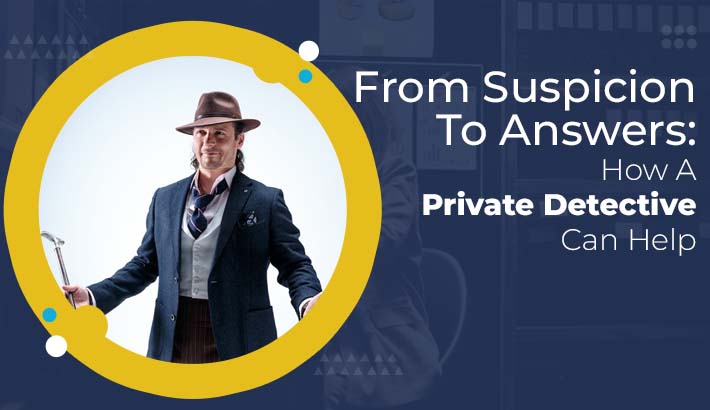In today’s complex and interconnected world, uncovering the truth can be a daunting task. Whether you’re facing a personal dilemma or a corporate challenge, having access to reliable information is crucial. This is where private investigators step in, acting as modern-day truth seekers who navigate the shadows to bring clarity and resolution.
Gone are the days of trench coats and fedoras (though some PIs might still favor a good hat!). Modern private investigators are highly skilled professionals equipped with cutting-edge technology and a global reach. They leverage advanced investigative techniques, data analysis, and digital forensics to uncover hidden truths, no matter how deeply buried they are.
The Diverse World of Private Investigations
The diversity of private investigation services is huge and expanding. Here’s a glimpse into some of the key areas where PIs make a significant impact:
- Individual Needs:
- Personal: Some of the examples include infidelity investigations, child custody cases, missing person cases, background checks, stalker cases, and defamation.
- Financial: These legal PI services include; asset recovery, fraud investigation, and prenuptial due diligence.
- Corporate Investigations:
- Internal: Corporate PIs address employee theft, violations of intellectual property rights, and competition intelligence.
- External: credit investigations, background checks on employees before hiring and on potential partners, and investigations for insurance claims are all important for company services.
- Digital Investigations:
- PIs are well versed in the internet, and information can always be retrieved even if deleted, as well as the internet footprint to bring about evidence for the case.
- They can also investigate cyberbullying and online scams that would ensure individuals and businesses in the virtual landscape are protected.
- Global Investigations:
- Today, the world is even more connected, and sometimes the facts are farther away than we think. International PIs with both physical and legal support can find their way around the intricate laws and customs of different countries and make investigations flow smoothly from one country to another.
The Modern PI’s Toolkit: Technology Meets Tradition
While the core principles of investigation remain steadfast—observation, fact-finding, and meticulous record-keeping—modern PIs leverage a powerful arsenal of technology to enhance their effectiveness:
- Databases and Public Records: Access to vast databases allows for comprehensive background checks, asset searches, and verification of information.
- Surveillance Technology: Discreet cameras, GPS tracking devices, and advanced audio recording equipment enable PIs to gather evidence without compromising the investigation.
- Data Analysis and Forensics: Extracting information from digital devices, analyzing social media activity, and uncovering hidden patterns within data sets are crucial skills in the digital age.
- Communication and Networking: Secure communication tools and a network of global contacts empower PIs to coordinate investigations effectively, even across international borders.
Why Choose a Private Investigators?
Amidst this overwhelming amount of information available today, sometimes it is difficult to glean pertinent facts from the superfluous non-sense. Here’s why a private investigator or detective agency can be your most valuable asset:
Expertise and Experience: PIs have a set of traits that include the qualities of a good investigator, legal insights, and practical experience. They are aware of when to investigate further, how to collect evidence that will stand up in court, and what type of evidence to exclude from a case.
Discretion and Confidentiality: Private investigations are a very sensitive affair and hence need to be done with a lot of confidentiality. Confidentiality in PIs is enforced through strict ethical principles and legal mandates for the duration of the process.
Efficiency and Time-Saving: Sometimes, time plays an important role. They are also fast at organizing resources, conducting extensive inquiries, and coming up with prompt reports, which saves you time and effort.
Peace of Mind: It is easy to understand why uncertainty can be a major source of stress. A PI can offer the desired intelligence as well as the surety that one is dealing with a professional who works in one’s best interest.
The Process of Hiring a Private Investigators
Due to the ever-growing demand for their services, the private investigation field is very vibrant and profitable. Here are some key steps to ensure you find the right PI for your needs:
Clearly Define Your Needs: Before looking for a PI, you should also be clear on the problem that you are experiencing and what you want to achieve.
Research and Get Recommendations: Preferred options include PIs with a healthy reputation supported by both past participants and reviews. Other types of recommendations can come from industry associations and legal professionals.
Schedule Consultations: To do this, meet with several PIs to talk about your case as well as their method, rate, and experience of solving similar cases.
Verify Credentials and Insurance: Make sure the PI has license and insurance coverage to practice in your state.
Remember, a private investigator is your partner in uncovering the truth. By choosing the right professional and providing them with all the relevant information, you can embark on a path towards resolution and achieve the peace of mind you deserve.
Where the Future of Private Investigation May Lead.
Private investigations are always growing and adapting to changing conditions. Here’s a glimpse into some exciting trends shaping the future of this dynamic field:
Artificial Intelligence (AI): In addition, there are a number of practical applications of AI, such as data analytics, face recognition, and social media monitoring. With time, AI is supposed to enhance investigative work, and the PIs will be in a better position to analyze large volumes of data and also enable them to find hidden relationships between pieces of information.
Cybersecurity Expertise: Though the need for people in cybersecurity is growing exponentially, it is a demand that will only increase with the advent of more technology in our lives. They will have the critical function of identifying cybercrimes, data-related breaches, or cases of fraud committed online.
Global Collaboration: The challenges the world is facing today require the PI’s to work more closely, and effectively, this will be possible only if there is close collaboration between the PI’s across geographical distances. Global systems and interoperable procedures will become a necessity to handle investigations with multi-jurisdictional ramifications.
Focus on White-Collar Crime: Financial fraud, intellectual property theft, and white-collar corporate espionage will always remain priorities, forcing the demand for PIs with specialized knowledge in white-collar crime investigations.
All these will definitely make the work of private investigation more effective. But the distinctive features of the human mind experience and ethics will continue to determine the nature of this profession.
Conclusion
Private investigators are not simply some stuffy characters from black-and-white movies; they are the real information warriors of today who have all the necessary information resources at their disposal and can easily operate all over the world. A good PI is like a great detective, no matter what the situation, whether you’re in a personal or business rel-ted conflict, your PI is your best ally in solving the case or coming to a positive resolution.



